No, Most People Are Not Meeting Through Online Dating
It has become an incontrovertible fact that most people are now meeting through online dating. What has convinced the world of this? An update of the 2017 How Couples Meet And Stay Together graph based on some follow-up surveys showing the percentage of people meeting online shooting up exponentially. The problem with this is that the last data points represented a record low of only 17 people each and furthermore were likely confounded by the pandemic limiting offline ways of meeting. The graph’s smooth line hides another fact which is that the percentage of couples reporting meeting online had actually fallen to 20-25% in 2018-19.
I also assessed a wide range of other data on how people were meeting their partners which had been mostly overlooked, and found evidence for this sorely lacking there as well. A problem with other datasets however tends to be that they simply ask how people met their current or most recent partners, while the HCMST data points represent how people met on those specific years. If a considerable number of people met their partners when online dating was less popular or was yet to exist, this could understate how many people are meeting online in recent years.
Has online dating’s dominance been exaggerated?
The Survey Center on American Life has kindly released the January 2023 American Perspectives Survey data from interviews of a large representative sample conducted in late 2022, allowing us to more confidently answer this question.
These graphs show where people met by various time intervals.
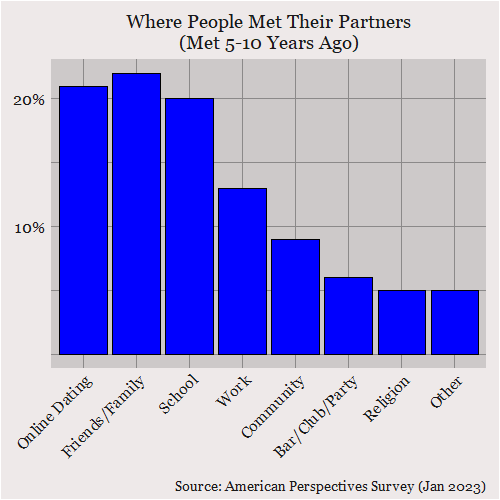
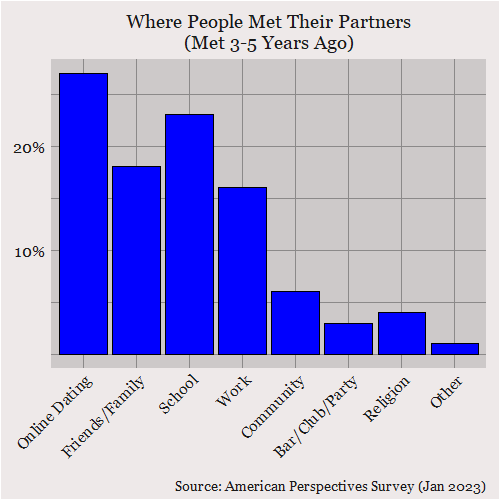
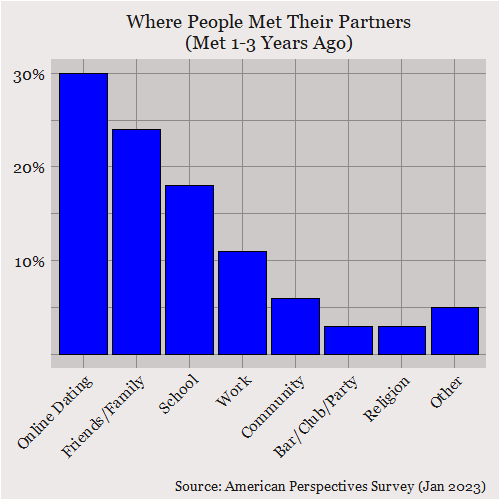

What we find is that of people who met their partners 5-10 years ago (from 2012-2017), 21% met through online dating, 3-5 years (2017-2019): 27%, 1-3 years (2019-2021): 30%, and within the past year: 26%. The samples sizes for these groups are 433, 210, 202, and 112 respectively. While these may not seem gigantic, they dwarf the sample sizes for the HCMST in the relevant years, and not just for the follow up surveys. Even in 2017 where some 40% reported meeting their partners online (though only slightly above 20% said they specifically met through online dating in their open ended responses), only 60 heterosexuals reported meeting their partners on this year. If we take all those who met from 2017-2022, we get a total sample size of 524. For those who met in the past year, the 95% CI would be 19-35%. There’s also little indication here of a further surge since 2017.
A caveat worth mentioning is that the HCMST figure simply refers to those who met ‘online’ rather than online dating apps and websites per se. However even adding all those who selected ‘other’ we’re still quite far from passing the halfway mark. Also, an interesting thing I found is that not all people who selected online dating in this survey reported being unacquainted with their partners when they started dating. 6% said they were close friends, 8% friends but not too close, and 11% casual acquaintances, for a total of 25%. This seems especially true among younger people, with 34% of under 29s who met through online dating stating they were acquainted in some way.
This is similar to the percentage of the 12% who reported meeting their partner online in a 2019 Pew survey reporting meeting through some online venue other than dating apps and websites such as social media (39%), and a Swiss survey where of the 25% who’d met online in 2017-18, 28% had done (Potarca, 2020), and a Canadian survey which in 2018 found that of the 17.5% who met their partner online, 32% had done (Qian & Hu, 2024).
While it’s difficult to say exactly what this means, it could point to some portion of the respondents selecting online dating having met through social networking or instant messaging services, meaning the added specificity of online ‘dating’ may not affect much.
It’s also interesting to see how the percentage of the youngest people meeting online is actually similar to that of the middle aged, seemingly due to still having ample opportunity to meet people at school. This indicates that to the extent that online dating is popular, it’s less that it’s preferred and more that it’s harder to meet people post-school.
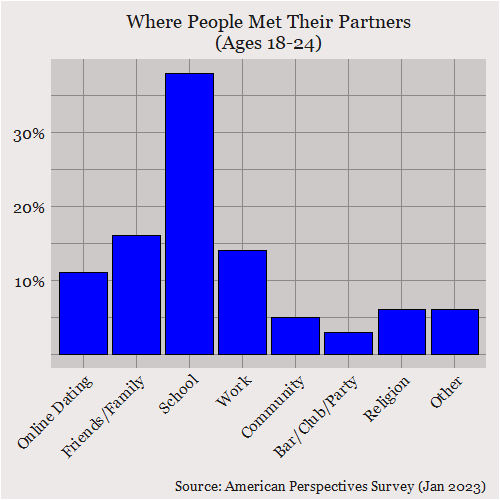
A final thing worth mentioning is that only 34% of 18-29 men and 31% 18-29 women had ever stepped foot into a dating app or website. Of them, 70% of men and 68% of women had ever been on a date through it, for a total of 24% of men and 21% of women, or about 20% of both heterosexual men and women. This shows that even if online dating did come to completely dominate, fears of the proliferation of soft harems wherein 90% of women are dating and hooking up with 5% of men are likely unwarranted.
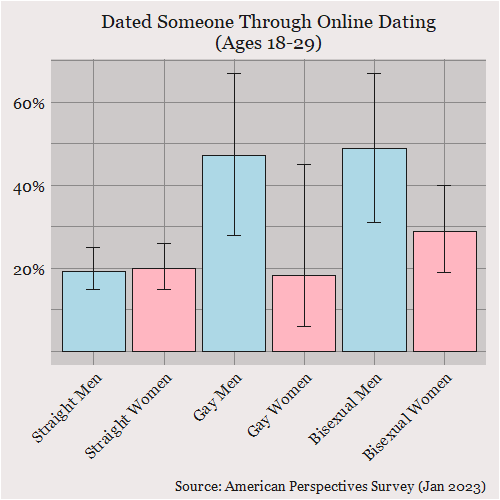
Finishing thoughts
Since this kind of trend taps into people’s anxieties that we are entering a dystopian era where everyone is confined to their little pods hooked into the metaverse it’s not hard to see why those graphs popped off. Black pillers were of course especially hyped. Dating apps have been a central focus of them for the past decade or so at this point, and the more relevant they are shown to be, I guess the more they feel that their narrative that they will lead to societal collapse through producing sexual inequality is justified, and the more they feel justified in laying all their dating woes at their feet.
A large reason why they are so highly focused on them and view them as the only feasible way to meet women is probably that their high levels of social anxiety and autistic traits make dating apps an alluring alternative to the prospect of real world social interaction, as well as simply having less such opportunities. This may be partially true on a broader level as part of a trend in risk aversion and men’s persisting role as initiator making a method which bypasses a good deal of the pain of rejection sound like a godsend. It makes sense why when this doesn’t give them the comfortable path to success they’d hoped it would that bitterness can ensue. The reality is there is no easy way or shortcut to dating success when you suffer from these or whatever other problems.
Overall, it seems like there is some way to go yet to where most people are meeting online, even if it has secured its place as the most popular meeting place by a small margin, with a close number meeting through friends and family and school and work remaining relevant. Regardless of exactly how prevalent dating apps may be, they don’t actually seem to transform dating dynamics much. If anything they may ironically lead to more assortative mating for attractiveness or ‘looksmatching’ if people are being filtered more by looks before other factors can come into play.
Many would say it’s an inevitability given other apparent social and technological trends, but at the same time both Match Group and Bumble are bleeding market value and it seems like they may be failing to attract the youth like they used to. Maybe it will be more in the form of social media apps like TikTok and Snapchat, or again back to the metaverse some kind of VR dating, but I wouldn’t be the one to ask.
References
Brown, A. (2020). Nearly Half of U.S. Adults Say Dating Has Gotten Harder for Most People in the Last 10 Years. Pew Research Center. https://www.pewresearch.org/social-trends/2020/08/20/nearly-half-of-u-s-adults-say-dating-has-gotten-harder-for-most-people-in-the-last-10-years/
Potarca G. (2020). The demography of swiping right. An overview of couples who met through dating apps in Switzerland. PloS one, 15(12), e0243733. https://doi.org/10.1371/journal.pone.0243733
Qian, Yue & Hu, Yang. (2024). How couples meet and assortative mating in Canada. Journal of Marriage and Family. 1-16. 10.1111/jomf.12967.
Moreno, E. (2024). Dating Apps Have Hit a Wall. Can They Turn Things Around? The New York Times. https://www.nytimes.com/2024/03/12/business/dating-apps-tinder-bumble.html
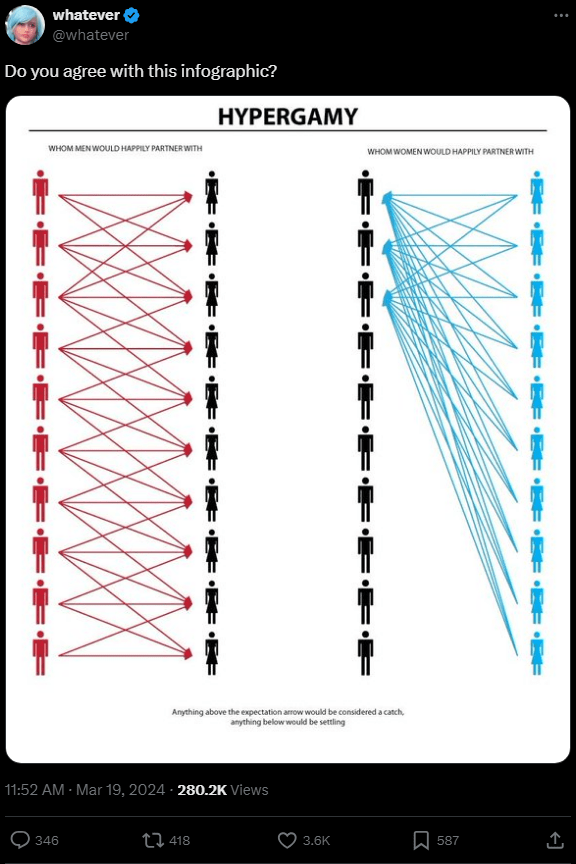
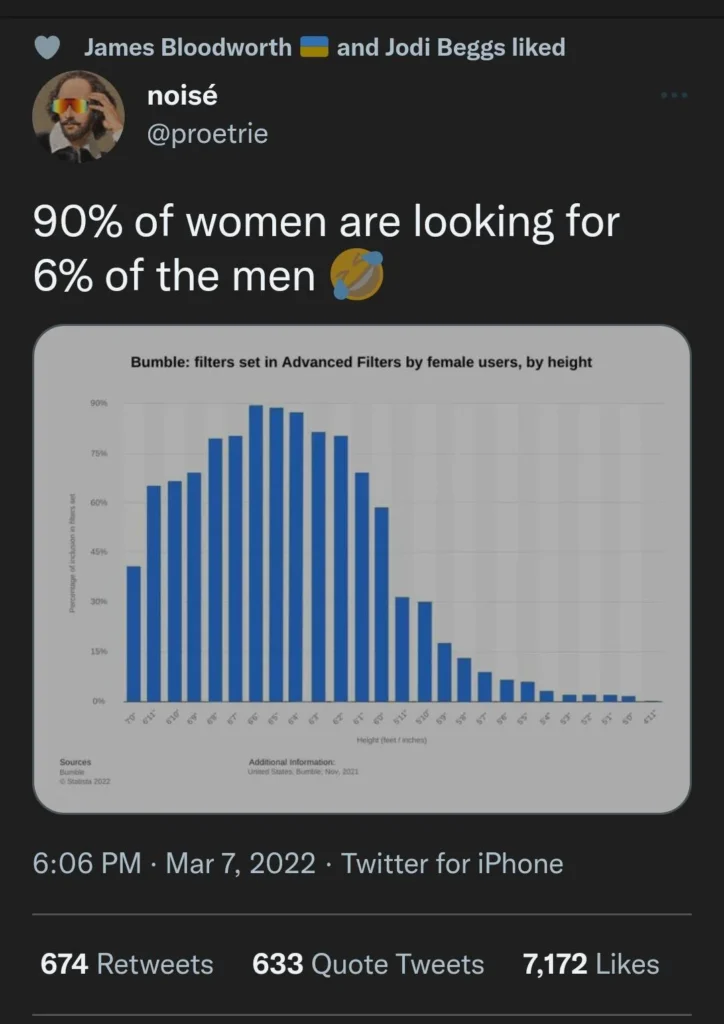

I do not even know how I ended up here but I thought this post was great I dont know who you are but definitely youre going to a famous blogger if you arent already Cheers
I just could not depart your web site prior to suggesting that I really loved the usual info an individual supply in your visitors Is gonna be back regularly to check up on new posts
I loved as much as youll receive carried out right here The sketch is attractive your authored material stylish nonetheless you command get bought an nervousness over that you wish be delivering the following unwell unquestionably come more formerly again as exactly the same nearly a lot often inside case you shield this hike
Thank you for the auspicious writeup It in fact was a amusement account it Look advanced to more added agreeable from you By the way how could we communicate
1win казино — популярная платформа для онлайн азартных игр. Оно предлагает широкий выбор слотов, настольных игр и ставок на спорт в удобном интерфейсе. 1win зеркало рабочее скачать поможет обойти блокировки и получить доступ к платформе с любого устройства. Бонусы для новых игроков и регулярные акции делают игру выгодной и увлекательной. Стабильная работа сайта и быстрые выплаты делают 1win привлекательным выбором для любителей азарта.
슬롯 무료 게임
Fang Jifan은 찻잔을 손에 들고 “내가 자랑하는 것이 아닙니다 …”
You made some really good points on your post. Definitely worth bookmarking for revisiting. Also, visit my website Webemail24 for content about Social Media Marketing.
Наиболее важные новинки моды.
Все эвенты самых влиятельных подуимов.
Модные дома, лейблы, высокая мода.
Новое место для стильныех хайпбистов.
https://km-moda.ru/style/525-parajumpers-istoriya-stil-i-assortiment/
I was recommended this website by my cousin I am not sure whether this post is written by him as nobody else know such detailed about my difficulty You are wonderful Thanks
Самые важные новинки моды.
Важные мероприятия всемирных подуимов.
Модные дома, торговые марки, haute couture.
Новое место для трендовых людей.
https://luxe-moda.ru/chic/356-rick-owens-buntar-v-chernyh-tonah/
Hey people!!!!!
Good mood and good luck to everyone!!!!!
Самые свежие новинки подиума.
Важные мероприятия лучших подуимов.
Модные дома, лейблы, высокая мода.
Приятное место для модных хайпбистов.
https://modastars.ru/
Самые важные новинки модного мира.
Актуальные эвенты самых влиятельных подуимов.
Модные дома, торговые марки, haute couture.
Свежее место для стильныех людей.
https://donnafashion.ru/